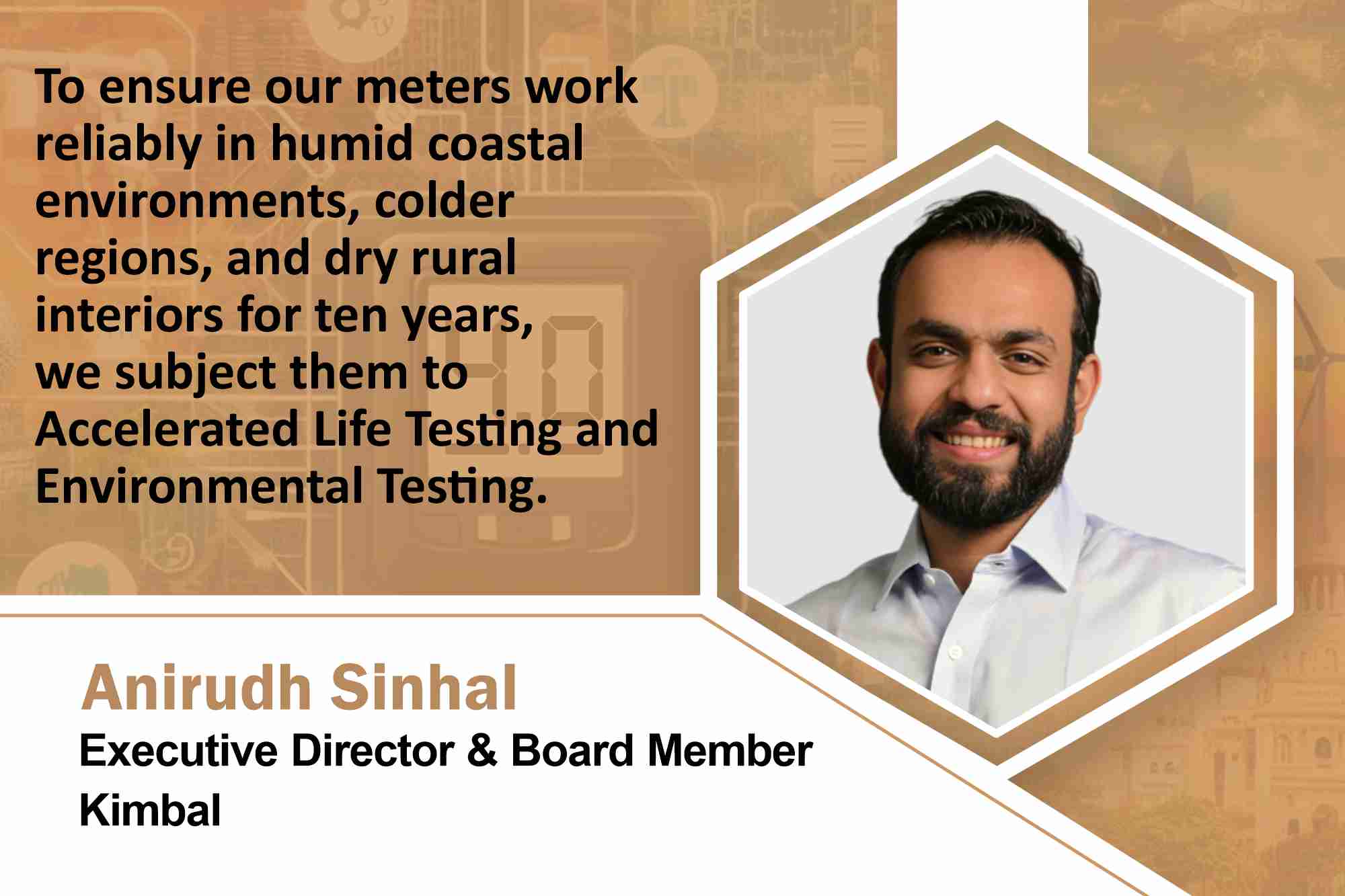Smart Meters Designed For Reliability: How Kimbal Is Scaling a Consumer-Centric Rollout Across India
By Staff Report June 25, 2025 12:02 pm IST
By Staff Report June 25, 2025 12:02 pm IST

The firm is collaborating with all the acclaimed Advanced Metering Infrastructure Providers (AMISPs) in the country, which has a nationwide footprint spanning 16 states to 20 utilities.
Robust manufacturing, consumer safeguards, and smart infrastructure solutions, such as those from Kimbal, are vital to ensuring the success of the RDSS scheme. Kimbal ensures quality by embedding the latest technologies into its products. Anirudh Sinhal explains more in talks with EPR. Let us hear him.
How do you ensure quality and scale in smart meter manufacturing, and how are consumer interests protected in rural and vulnerable areas?
We have crossed the 3.14 million smart meter supply milestone nationwide, representing a healthy 10 per cent of total installations. Our ability to deliver at this scale stems from the strength of our uniquely designed manufacturing process. AI-enabled automated production lines and in-house NABL-accredited labs power our scale. We have a daily process of selecting random samples from the shop floor and subjecting them to rigorous Ongoing Reliability Testing. To ensure our meters work reliably in humid coastal environments, colder regions, and dry rural interiors for ten years, we subject them to Accelerated Life Testing and Environmental Testing. We are currently collaborating with all the acclaimed Advanced Metering Infrastructure Providers (AMISPs) in the country, which have a nationwide footprint spanning 16 states.
Consumer protection sits at the heart of the smart-meter rollout in India. A prepaid model replaces unpredictable lump-sum bills with bite-sized recharges of ₹50 and ₹100, enabling low-income households to better control their budgets. Automated low-balance SMS alerts and negative-balance support mandated by the Electricity (Rights of Consumers) Rules 2020 prevent surprise cut-offs and guarantee 24/7 redressal of grievances. Finally, if an issue arises, the scheme mandates a robust 24/7 grievance redressal system with helplines operated by distribution companies.
How is India advancing its smart meter installations to meet the 2026 target?
The Revamped Distribution Sector Scheme aims to install 250 million prepaid smart meters by March 2026. By May 2025, 220 million meters were sanctioned, 14.3 million awarded, and 30.6 million installed – only 12 percent of the goal. But the momentum is improving. The Power Ministry now logs 1.12 lakh installations every single day, an outstanding pace unmatched by any other country worldwide. Still, output must increase by 8X to meet the deadline. The government’s transparency architecture, standardised TOTEX bids, live dashboards, performance-linked grants and independent audits put clear guardrails around the rollout. Yet sustained execution speed over the next few months will decide whether the target is met or slips into an extended timeline.
How is Kimbal addressing the technical, logistical and consumer awareness challenges of large-scale smart meter deployment under the RDSS rollout?Previously, rooftop solar installations required a second meter to record both exports and imports accurately. Today, one smart meter handles it all, opening the door to a fully bidirectional grid where consumption and generation are visible in real-time. Smart meters supply that visibility, turning households and businesses into prosumers. The same intelligence enables microgrids for hospitals, campuses, and villages to balance local generation, storage, and load.
At Kimbal, we see ourselves as builders of this foundational layer. Through the RDSS rollout, we are deploying smart infrastructure, including meters, communication, and data systems, that will enable these more advanced, decentralised applications to flourish in the future.
A project of this magnitude, replacing millions of legacy meters, is far more than just a hardware swap. Challenges are multifaceted. First, there is the crucial element of consumer awareness and acceptance. Second, is the sheer logistical complexity of carrying out this replacement across incredibly diverse geographies, from dense urban lanes to remote rural homes. Finally, there is the technical challenge of integrating this new, advanced infrastructure with the existing IT systems of the distribution utilities. Synchronising each legacy meter’s serial number and configuration details with its replacement smart meter is notoriously complex. To help our AMISP partners tackle this efficiently, Kimbal developed a Workforce Management System that is further empowered with our in-house developed AI-enabled meter reading solution that boasts an accuracy level of 95 percent.
**********************************************
We use cookies to personalize your experience. By continuing to visit this website you agree to our Terms & Conditions, Privacy Policy and Cookie Policy.